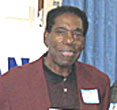The following was published in the Wichita Eagle Beacon May 14, 2006watch full Wonder Woman film online
by the Associated PressWatch movie online The Transporter Refueled (2015)
 MANHATTAN – Harold Robinson, the first black scholarship athlete in what would become the Big 12 Conference, died at 76.
MANHATTAN – Harold Robinson, the first black scholarship athlete in what would become the Big 12 Conference, died at 76.
Robinson, a center who joined the Kansas State football team in 1949, died Tuesday at his home in Wharton, N.J., the school said. A cause of death was not given.
“His story was so compelling and the challenges he faced were so great that we cannot comprehend them,” said Ron Prince, the first black head football coach at Kansas State.
Robinson was born and raised in Manhattan, where he made the varsity football team in high school. After graduation, he tried out for Kansas State’s team. In 1949, there were no blacks on the Wildcats or any of the teams in what was then the Big Seven Conference.
“When I walked on the practice field I was waiting for someone to say, ‘Hey, you’re not supposed to be here.’ But nobody ever said anything,” he told the campus newspaper, the Kansas State Collegian, in 2003.
Robinson recalled that then-coach Ralph M. Graham welcomed him. Graham, who died in October, had coached black players at Wichita State.
“People have to give him credit for letting black players on the team,” Robinson told the student newspaper. “Jackie Robinson had Branch Rickey who brought him into Major League Baseball. If it wasn’t for Ralph Graham, I wouldn’t have been playing at K-State.”
After Harold Robinson made the football team, Jackie Robinson — who was not related — wrote Harold Robinson a letter of congratulations.
“He didn’t know my address, so he just sent it to K-State Athletics,” Robinson said, referring to the player who broke baseball’s racial barrier two years earlier in 1947. “I still have the envelope.”
When Robinson began playing, the U.S. Supreme Court was still five years away from issuing the landmark Brown v. Topeka Board of Education decision that ended segregated education. Jim Crow laws were commonplace.
While his teammates stayed in hotels during away games, Robinson often was forced to stay in private homes. He told the student newspaper he missed only one game while at Kansas State. Memphis State, he recalled, “didn’t even allow blacks in the stadium, much less players.”
At first, he said some coaches from other schools and some players objected to his presence.
“All these guys who didn’t care for me, the next thing you know they were my buddies. The whole team, they all protected me. I enjoyed it all. At the time I didn’t realize how important it was. All I wanted to do was play ball.”
Robinson earned first team All-Big Seven honors in 1950, despite playing on a 1-9-1 team. He was inducted into the Kansas State Athletics Hall of Fame in 2004.
Other black athletes followed Robinson. Among them was golfer Tiger Woods’ late father, Earl Woods, who became the first black baseball player in the conference when he joined Kansas State’s squad in 1952.
Robinson served with the U.S. Army during the Korean War, where he received a Purple Heart.
He is survived by his wife, Ann, and four daughters, Beth R. Shann, Melanie Robinson, Judith Robinson-Phillips and Sherry L. Robinson.
A memorial service was held Saturday in Wharton, to be followed Monday by a funeral and burial in Manhattan.